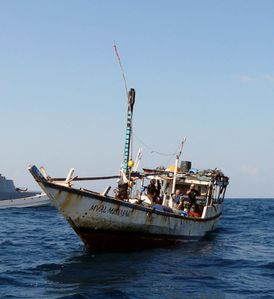The Evertsen releases 13 pirates for lack of a host country, a bug?

(BRUSSELS2) As announced on my twitter feed, the 13 suspects who were apprehended on December 2 by the Dutch frigate Evertsen have been released. The Dutch Ministry of Defense announced it on Thursday. It's now done. Dutch sailors put the Somali boat back in the water off the northern Somali coast. For two weeks, Dutch and European officials tried to approach the surrounding countries (read: The Evertsen is going to miss the turkey because of these "damn" pirates). The ace ! The last country approached, Kenya, refused support. As a result, the crew of the Evertsen will not arrive in time at their home port, Den Helder, at Christmas. It will be rather for the New Year... A bug for the EUNAVFOR Atalanta operation?
Some Dutch officials think so. They thus blamed, directly, the European leaders for not having done their job. The Ministry of Defense has thus published a press release in which it says “to regret that the European Union has not succeeded in finding a solution” (read here). The Minister of Defence, Eimert Van Middelkoop, thus regretting "that no country is prepared to prosecute the pirates". Personally, I find this statement a bit "inflated" (to be polite ...). Inflated Dutch!
There was, indeed, a country which could judge the pirates: the Netherlands quite simply (1). According to the laws of the sea, and the regulations of Atalanta (the Joint Action), it was even the "first" on the list. Only the Netherlands declined their jurisdiction, very quickly. For understandable but somewhat selfish reasons: in particular, they do not want to have to give asylum to the Somalis afterwards, once they have served their sentence. And there were also perhaps some evidentiary issues. Then accusing Europeans and Africans of lacking solidarity is, after all, a little inappropriate. The Dutch could also, very well, like the French, take back their national flag and deliver the suspects to justice in Puntland (autonomous region of Somalia), for example. Only they didn't have the idea... (or the courage...). Finally, the situation on board was beginning to be critical: the Somalis had thus started a hunger strike, according to the Dutch Ministry of Defence. All these reminders to show that pointing an accusing finger at someone is pretty easy on the matter. The agreements the EU has are not perfect. But they have brought nearly one out of two arrested suspects to justice, which is not bad. More delicate is, now, to perfect these agreements and to find a solution. A solution, what solutions?
1. In the very short term, the other solution would have been to transfer to another ship the pirates who would have, in fact, carried out the work which the Dutch did not want/could not carry out. Without qualifying this solution morally (-:)), it presented a serious drawback, of a legal nature: the breach of legality, which could constitute a procedural defect before a court.
2. In the longer term, the Dutch, like other countries (notably Russia), have proposed to establish an international tribunal to judge pirates. This attractive solution at first sight encounters many drawbacks, of a procedural nature - what law should be applied to this court? - financial - who will pay these judges, etc... - and equity - why only judge pirates and not also polluters, illegal fishermen, etc... Moreover, it goes the other way around of the law of the sea, which consists rather in having each State adopt appropriate legislation and in sanctioning piracy (1).
3. In the coming weeks, all that remains is to convince the countries of the region to continue to welcome pirates, and possibly convince others. Kenya - which already has more than 100 suspects in its jails awaiting trial - is, perhaps, justified in refusing other arrivals and asking for additional assistance from the Europeans.
4. In the longer term, therefore, all that remains for the Europeans is to engage, quickly, in an action to stabilize Somalia. So that at least, in Somaliland and Puntland, the two most stable regions, we can envisage more in-depth action against piracy (3).
(1) Let's also remember that there was a second ship on site during the arrest: a Canadian NATO ship which... let the Dutch do their thing. Quite simply, because he knew he could not bring these suspects to justice. The EU has agreements that NATO does not.
(2) Let us add - if my information is correct - that the meetings at the United Nations on the question of the legal framework for the repression of piracy do not really arouse self-denial. Most European countries did not even deign to answer the questionnaire sent by the international organization.
(3) Piracy is, in itself, only a "small" problem compared to the others from which Somalia suffers: internal exodus, threatening famine, exacerbated risk of terrorism.
(NVP)
Comments closed.